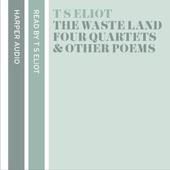
|
T. S. Eliot Reads The Waste Land, Four Quartets and Other Poems
CD-Audio
Main Details
| Title |
T. S. Eliot Reads The Waste Land, Four Quartets and Other Poems
|
| Authors and Contributors |
By (author) T. S. Eliot
|
| Physical Properties |
| Format:CD-Audio | | Dimensions(mm): Height 125,Width 142 |
|
| Category/Genre | Poetry by individual poets |
|---|
| ISBN/Barcode |
9780007202638
|
| Classifications | Dewey:821.912 |
|---|
| Audience | |
|---|
| Edition |
Unabridged edition
|
|
Publishing Details |
| Publisher |
HarperCollins Publishers
|
| Imprint |
HarperCollins Publishers Ltd
|
| Publication Date |
21 March 2005 |
| Publication Country |
United Kingdom
|
Description
It is always something of a revelation to listen to a poet reading his own words, and these tapes are no exception. Eliot clearly and evenly characterises and reveals the voices of some of his most important works in this excellent reading. 'The Waste Land' caught the imagination of the age with its powerful emotional impact. Eliot felt that the modern Western city had become a sterile desert wasteland, and in it life had become a sham pretence, with no content but stale conventionality. The 'Four Quartets' express the poet's whole-hearted acceptance of the Christian faith. Each poem describes a meditation which leads to a reconciliation with the burden of the past.
Author Biography
T. S. Eliot, (1888-1965) recast 20th century English poetry with a whole new vocabulary of technique, giving voice to a bold, vibrantly original Modernist style. In addition to his poetry, his body of work includes many landmark critical essays, as well as plays such as The Cocktail Party and Murder in the Cathedral. In 1948, he won the Nobel Prize for Literature. T. S. Eliot, (1888-1965) recast 20th century English poetry with a whole new vocabulary of technique, giving voice to a bold, vibrantly original Modernist style. In addition to his poetry, his body of work includes many landmark critical essays, as well as plays such as The Cocktail Party and Murder in the Cathedral. In 1948, he won the Nobel Prize for Literature.
|